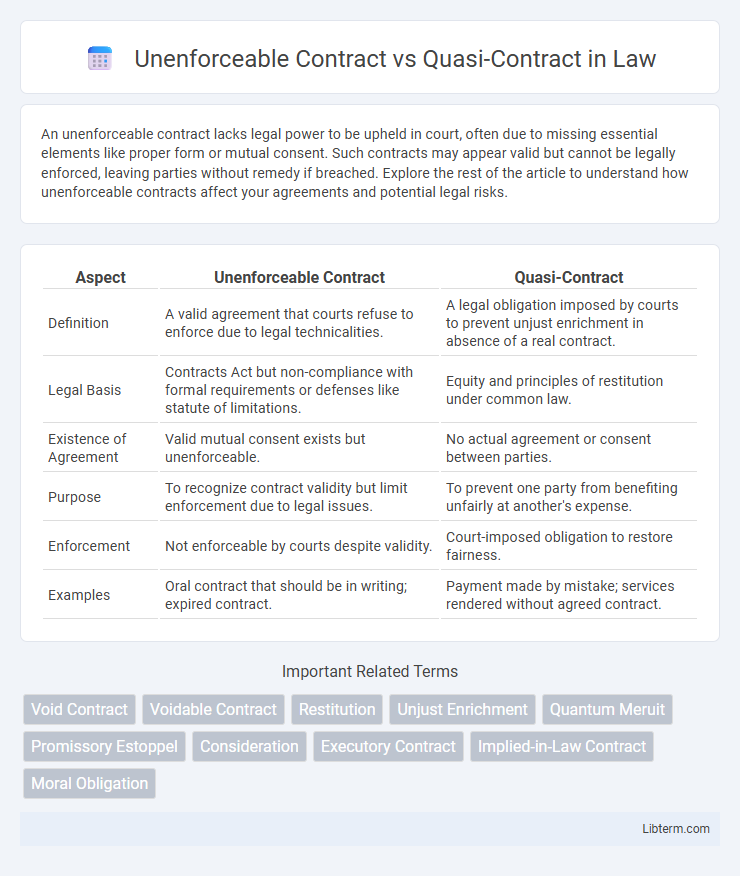An unenforceable contract lacks legal power to be upheld in court, often due to missing essential elements like proper form or mutual consent. Such contracts may appear valid but cannot be legally enforced, leaving parties without remedy if breached. Explore the rest of the article to understand how unenforceable contracts affect your agreements and potential legal risks.
Table of Comparison
| Aspect | Unenforceable Contract | Quasi-Contract |
|---|---|---|
| Definition | A valid agreement that courts refuse to enforce due to legal technicalities. | A legal obligation imposed by courts to prevent unjust enrichment in absence of a real contract. |
| Legal Basis | Contracts Act but non-compliance with formal requirements or defenses like statute of limitations. | Equity and principles of restitution under common law. |
| Existence of Agreement | Valid mutual consent exists but unenforceable. | No actual agreement or consent between parties. |
| Purpose | To recognize contract validity but limit enforcement due to legal issues. | To prevent one party from benefiting unfairly at another's expense. |
| Enforcement | Not enforceable by courts despite validity. | Court-imposed obligation to restore fairness. |
| Examples | Oral contract that should be in writing; expired contract. | Payment made by mistake; services rendered without agreed contract. |
Introduction to Unenforceable Contracts and Quasi-Contracts
Unenforceable contracts are agreements that, while valid in formation, cannot be enforced by a court due to legal technicalities such as the absence of written documentation required by the Statute of Frauds. Quasi-contracts, also known as implied-in-law contracts, are not true contracts but are judicial remedies imposed to prevent unjust enrichment when no formal agreement exists between parties. Both concepts serve distinct roles in contract law: unenforceable contracts highlight procedural limits on enforceability, whereas quasi-contracts address fairness by creating obligations absent explicit consent.
Definition of Unenforceable Contract
An unenforceable contract is a valid agreement that cannot be enforced by the courts due to specific legal technicalities, such as the lack of a written form when required by the Statute of Frauds. Unlike quasi-contracts, which are not true contracts but legal constructs imposed to prevent unjust enrichment, unenforceable contracts have all essential elements but fail to comply with certain formalities. The key aspect of an unenforceable contract lies in its inability to obtain judicial relief despite mutual assent and consideration.
Key Features of Unenforceable Contracts
Unenforceable contracts lack legal remedies due to statutory or procedural defects, such as missing written requirements or expiration of the statute of limitations. These contracts are valid agreements but cannot be enforced in court, distinguishing them from void contracts which are invalid from inception. Unlike quasi-contracts, which are implied by law to prevent unjust enrichment, unenforceable contracts arise from formal agreements that fail to meet certain legal criteria.
Definition of Quasi-Contract
A quasi-contract is a legal construct imposed by courts to prevent unjust enrichment when no actual agreement exists between parties, unlike unenforceable contracts which fail due to defects such as illegality or lack of capacity. It is not a true contract but a judicial remedy that obligations as if a contract existed to promote fairness. Quasi-contracts compel restitution or compensation based on equity principles rather than mutual consent.
Essential Characteristics of Quasi-Contracts
Quasi-contracts are legal constructs imposed by courts to prevent unjust enrichment when no actual agreement exists between parties. Essential characteristics include the absence of a mutual agreement, the obligation being imposed by law, and the purpose of restitution or compensation. Unlike unenforceable contracts, quasi-contracts are not based on consent but on equitable principles to ensure fairness.
Legal Basis and Formation: Unenforceable vs Quasi-Contract
An unenforceable contract lacks a valid legal basis or essential element, such as proper form or consideration, preventing courts from enforcing its terms despite mutual agreement. In contrast, a quasi-contract is not an actual agreement but a legal construct imposed by courts to prevent unjust enrichment when no formal contract exists. The formation of an unenforceable contract depends on defective compliance with contractual requirements, whereas a quasi-contract arises solely from equitable principles to ensure fairness.
Differences Between Unenforceable Contracts and Quasi-Contracts
Unenforceable contracts lack legal validity due to certain defects, such as missing essential elements or failure to comply with statutory requirements, making them invalid despite mutual agreement. Quasi-contracts, on the other hand, are judicial constructs imposed to prevent unjust enrichment, even in the absence of an actual agreement between parties. The primary difference lies in unenforceable contracts originating from defective agreements, whereas quasi-contracts arise by operation of law to enforce fairness and restitution.
Common Examples and Case Studies
Unenforceable contracts often arise in cases where agreements lack legal formalities, such as oral contracts for real estate transactions, which courts typically reject due to the Statute of Frauds. Quasi-contracts, exemplified by cases like *Cotnam v. Wisdom*, occur when a party is unjustly enriched and the court imposes an obligation to prevent unfairness, even absent a formal agreement. Common scenarios include emergency medical services provided without explicit consent (quasi-contract) versus contracts rendered unenforceable by illegality or absence of consideration.
Remedies and Legal Consequences
Unenforceable contracts cannot be enforced by the courts due to legal defects, leaving parties without judicial remedies, while quasi-contracts impose obligations to prevent unjust enrichment despite the absence of an actual agreement. Remedies for unenforceable contracts are generally limited to restitution if one party has partially performed, whereas quasi-contract remedies require the benefiting party to compensate the other to restore fairness. Legal consequences of unenforceable contracts typically result in discharged duties, but quasi-contracts create implied obligations recognized by courts to uphold equitable principles.
Conclusion: Choosing the Right Legal Approach
Selecting the appropriate legal approach hinges on the specific circumstances of the agreement and the parties involved; unenforceable contracts arise from formal defects, while quasi-contracts are imposed by courts to prevent unjust enrichment. Courts prioritize remedies through quasi-contracts when no true agreement exists but equity demands compensation. Understanding these distinctions ensures the optimal legal framework is employed to safeguard rights and obligations effectively.
Unenforceable Contract Infographic

 libterm.com
libterm.com